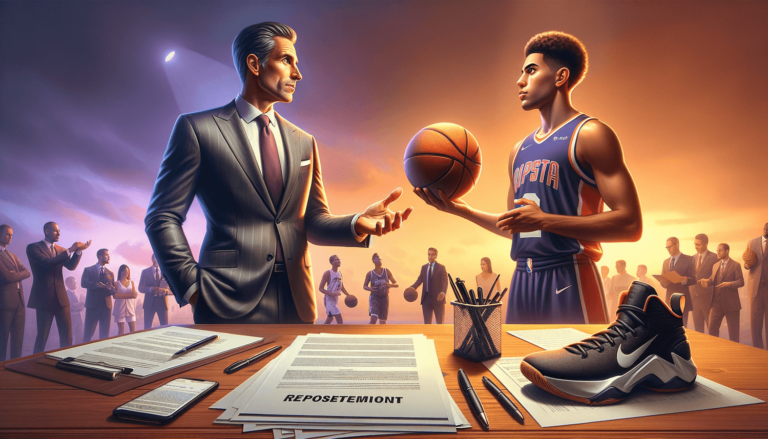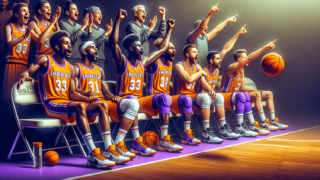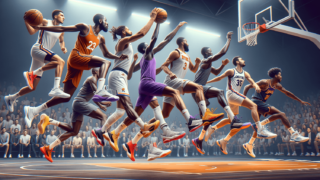
Role of Basketball Agents and Player Representation
Written by: Basketball Universe
Last updated:

In the fast-paced and fiercely competitive world of professional basketball, the role of agents and player representation is becoming increasingly significant. As a fan or an aspiring player, you might wonder what exactly goes on behind the scenes and how these key players shape the trajectory of an athlete’s career. So, let’s buckle up and dive into the fascinating realm of basketball agents, negotiations, and everything in between, while maintaining a fun and professional tone, of course. Get ready to feel like an insider as we explore the impact of effective player representation on both athletes’ lives and the ever-evolving basketball landscape.
Role of Basketball Agents and Player Representation
Basketball agents play a crucial role in managing and advancing the careers of professional players. They negotiate contracts, secure endorsement deals, and provide guidance for their clients in various aspects of their personal and professional lives. Basketball agents also act as a liaison between the players and the teams, ensuring that the interests of both parties are met throughout negotiations. In addition, they are responsible for cultivating relationships within the industry, creating opportunities for their clients, and helping them navigate the complex world of professional basketball.
The Evolution of Basketball Agents
The emergence of basketball agents can be traced back to the early days of professional basketball. Over time, as the sport evolved and gained wider popularity, so did the roles and responsibilities of basketball agents. In the beginning, these agents were mainly responsible for contract negotiations, but today their scope has expanded well beyond that singular focus.
Basketball History and the Rise of Agents
As the professional game evolved, the demand for player representation within the sport became more and more pronounced. Within the rich tapestry of basketball history, agents started to carve out their niche as indispensable figures in the sport’s growth and development. They have been instrumental in shaping the present-day landscape of professional basketball by advocating for better contracts, lucrative endorsement deals, and overall improved player welfare.
The Different Services Provided by Basketball Agents
Let’s dive into the specific services provided by basketball agents that make them an invaluable part of an athlete’s support system:
Contract Negotiations
One of the most critical responsibilities of a basketball agent is to negotiate contracts on behalf of their clients. They take into consideration factors such as the player’s performance, market value, and future potential to craft deals that provide their clients with optimal financial and professional rewards. These contracts often include player salaries, bonuses, and various terms related to job security and performance expectations.
Endorsement Deals
Basketball agents help their clients capitalize on their brand value by securing endorsement deals with reputable companies. Endorsements can be a significant source of revenue for athletes and often involve product placements, public appearances, or promotions in the media. An agent’s network and relationships with brands play a massive role in scoring these opportunities for their clients.
Public Relations and Reputation Management
A player’s public image can have a direct impact on their earning potential and career trajectory. Basketball agents work to build and maintain their clients’ reputations through various means, such as social media management, community outreach initiatives, and damage control in times of controversy. Maintaining a positive public image allows athletes to attract more opportunities and partnerships, both on and off the court.
Career Advice and Guidance
Agents provide valuable insight and guidance for players at all stages of their careers, whether they are just stepping into the league, dealing with a slump, or contemplating retirement. This advice can span across a variety of domains, including identifying the best teams for an athlete’s skill set, exploring international playing opportunities, or even post-career pursuits such as coaching, broadcasting or business ventures.
Finding the Perfect Agent: What to Look For
With so many basketball agents out there, narrowing down the options can be a daunting task for players. Here are a few factors to consider when choosing the right agent to represent your interests:
Expertise and Experience
An agent’s level of expertise and experience in the basketball industry is paramount. Players should prioritize agents who have a proven track record of successful contract negotiations, endorsements, and career guidance. Experienced agents possess the necessary connections, charisma, and industry knowledge to ensure that their clients receive the best representation possible.
Compatibility
Finding an agent who understands a player’s unique needs, wants, and aspirations is vital. A harmonious relationship between player and agent fosters trust and communication, which are essential qualities for success. Consider your personal compatibility with a prospective agent, as you will be partnering closely with them throughout your career.
Financial Transparency
Financial transparency is crucial when it comes to building trust between a player and their agent. Players should seek agents who maintain an open line of communication and provide clarity on their commission, fees, and any other financial arrangements. A relationship built on trust and transparency eliminates potential conflicts of interest and ensures the player’s best interests are protected.
The Agent-Player Relationship: Beyond Business Transactions
The business side of basketball is just one aspect of an agent’s role in a player’s life, but their responsibilities often extend beyond the negotiating table. Multiple facets make up the unique bond between basketball agents and their clients:
Providing Emotional Support
A professional athlete’s journey is often fraught with ups and downs, both on and off the court. Basketball agents are there to provide mental and emotional support during times of adversity, whether it’s due to a slump in performance, media controversies, or injury setbacks. A comforting presence in these situations can make a world of difference for a player’s overall well-being and resilience.
Personal Life Assistance
Because of the hectic schedules and constant travel associated with a professional basketball career, players often require assistance in managing various aspects of their personal lives. This can include coordinating the logistics of moving to a new city, helping with legal matters, managing real estate investments or even planning offseason vacations. An agent’s investment in their client’s personal life can be invaluable at maintaining a sense of stability and alleviating stress.
Impact of Basketball Agents on the Sport
Basketball agents and player representation have undoubtedly shaped the modern iteration of the sport we know today. Let’s take a look at how agents contribute positively to the game:
Empowering Players in Decision Making
Today’s athletes are more empowered than ever when it comes to making vital decisions about their careers. Basketball agents enable players to take control of their destinies, whether it’s choosing a compatible team or leveraging their personal brand to maximize their earning potential. As a result, professionals often find fulfillment and success in their various pursuits, both on and off the court.
Driving Fair Compensation
The major strides in player compensation in recent decades can be attributed, in part, to the diligent work of basketball agents. Tireless negotiation efforts have led to more equitable contracts for players, securing financial security and a higher quality of life. With the influence and support of agents, players have been able to challenge the status quo and ultimately redefine their value within the industry.
Setting Standards in Professional Basketball
Basketball agents not only drive change for individual players but also influence the broader standards and practices in the world of professional basketball. Through contract negotiations and the representation of player interests, agents help to establish precedents and set new benchmarks for recruitment, player welfare, and financial arrangements within the sport.
In conclusion, basketball agents and player representation have become integral facets of the sport, both on and off the court. Through steadfast advocacy, unwavering support, and shrewd negotiations, agents help to empower athletes and shape the game into what we know and love today.
Rules Governing Basketball Agents
It’s essential to understand that the world of basketball agents is also governed by a set of regulations and guidelines designed to protect both players and agents. Some of these rules include requirements for agent certification, limitations on the agents’ interaction with college athletes, and specified ethical standards that must be upheld throughout their practice.
NBA Players Association (NBPA) Certification
To become a certified basketball agent authorized to represent NBA players, prospective agents must apply for certification with the NBA Players Association (NBPA). The NBPA has a set of criteria and guidelines that must be met by applicants, including passing a written examination, having a bachelor’s degree or higher, and demonstrating clear ethical conduct. This process helps maintain professional standards and ensures that players are represented by knowledgeable and ethical agents.
NCAA Regulations
The NCAA has specific rules relating to college athletes and their interactions with agents. These regulations are in place to protect student-athletes from potential exploitation and maintain their eligibility for collegiate sports. However, the NCAA recently loosened some of these restrictions, allowing players to consult with NCAA-certified agents to explore their professional prospects, provided they maintain their amateur status. Understanding and following these guidelines is crucial for agents, as failing to abide by them can result in serious consequences for both the player and the agent.
Ethical Standards and Conduct
Basketball agents must adhere to a set of ethical standards and principles while representing their clients. This includes maintaining a fiduciary duty to prioritize the interests of the player, avoiding conflicts of interest, and maintaining the confidentiality of client information. Agents who engage in unscrupulous behavior, such as bribing team officials or misappropriating client funds, may face severe repercussions, including losing their certification, legal action, or damage to their professional reputation.
Tapping into the Global Market: Basketball Agents and International Opportunities
As basketball continues to expand its global reach, agents play an increasingly critical role in helping players explore opportunities in international leagues. More and more athletes from around the world are pursuing professional careers in basketball, and agents serve as key facilitators in bridging the gap between these players and leagues across the globe.
Navigating Different Leagues and Competitions
One of the primary challenges in exploring international opportunities is understanding the nuances of different leagues and competitions. Every country has its specific structure, competitive level, and cultural nuances that can impact a player’s experience. Basketball agents’ knowledge of these different leagues and their networks within the international basketball community proves invaluable in helping players make informed decisions about where and how to continue their careers.
Contract Negotiations and Legal Frameworks
Navigating contracts and negotiations for international basketball leagues requires a thorough understanding of local laws, customs, and regulations. Basketball agents must be well-versed in the legal frameworks that govern these contracts, ensuring fair and equitable agreements are reached for their clients, regardless of the country or league in which they may compete.
Transition and Post-Career Opportunities
Basketball agents also play a crucial role in supporting athletes’ transitions back to their home country or pursuing post-career opportunities following an international stint. This can include facilitating moves to different leagues, negotiating coaching or broadcasting roles, or providing guidance on business ventures and other endeavors beyond the basketball court.
As basketball continues to grow as a global sport, basketball agents and player representation are more important than ever in helping athletes navigate the complexities of an increasingly connected and competitive industry.
Frequently Asked Questions (FAQ)
As an aspiring athlete or a curious fan, you might have some questions related to basketball agents and player representation. We compiled a list of common questions, along with concise answers to help clarify some important aspects of this fascinating field.
1. How do basketball players find an agent?
Players often find agents through referrals from coaches, teammates, or family members. They can also conduct their own research, look into an agent’s reputation and client list, or attend networking events and seminars where agents are present.
2. How do basketball agents get paid?
Agents usually earn a commission from the contracts they negotiate for their clients. This commission is typically a percentage of the athlete’s contract and endorsement earnings. It’s important for players and agents to clearly agree on commission rates and terms upfront.
3. Are basketball agents required to have a specific degree or qualification?
To become a certified basketball agent authorized to represent NBA players, agents must possess a bachelor’s degree and obtain certification from the NBA Players Association (NBPA) by fulfilling other requirements, including passing a written examination and demonstrating ethical conduct.
4. How do basketball agents land endorsement deals for players?
Basketball agents use their network and connections within the industry to approach companies for endorsement opportunities. They pitch their clients based on their performance, marketability, and brand value. The player’s public image and relevance also play a significant role in securing endorsement deals.
5. What challenges do basketball agents face while working with players?
Agents face challenges such as negotiating complex contractual agreements, navigating strict NCAA guidelines, managing their clients’ expectations, maintaining ethical standards, and balancing the interests of different stakeholders in the industry.
6. How does the relationship between a college athlete and a basketball agent work?
Recently, the NCAA has allowed college athletes to consult with NCAA-certified agents for professional prospects, provided they maintain their amateur status. Agents can provide guidance on the athlete’s potential draft position and professional opportunities without compromising their college eligibility.
7. Can a basketball agent represent clients in different sports?
An agent can represent clients in multiple sports, as long as they have the required certifications and expertise in each respective sport’s rules, regulations, and industry dynamics. Some agents choose to specialize in one sport while others represent clients across various sports.
8. What organizations oversee basketball agents and their conduct?
Basketball agents are primarily governed by the NBA Players Association (NBPA), which certifies and oversees agent conduct. Additionally, the NCAA has rules and guidelines that agents must follow when interacting with college athletes.
9. How do basketball agents help players transition to post-playing careers?
Agents assist players in exploring opportunities such as coaching, broadcasting, or other business ventures after their playing careers. They leverage their networks within the industry and provide guidance on the best options for their clients based on their interests and strengths.
10. Can basketball agents lose their certification?
Yes, basketball agents can lose their certification if they engage in unscrupulous behavior, violate the rules and guidelines set forth by governing bodies like the NBA Players Association or the NCAA, or fail to comply with ethical standards mandated for agent conduct.
Featured Posts
- No pillar pages found.




